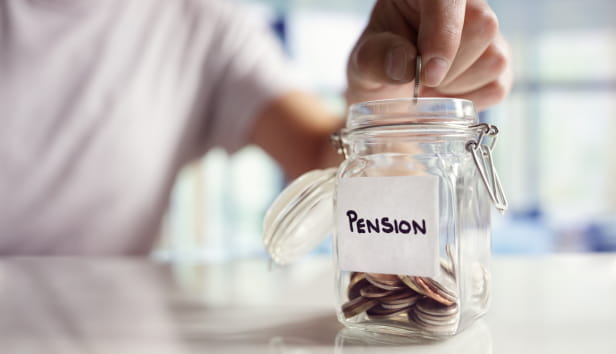

This article is for general guidance only and is not financial or professional advice. Any links are for your own information, and do not constitute any form of recommendation by Saga. You should not solely rely on this information to make any decisions, and consider seeking independent professional advice. All figures and information in this article are correct at the time of publishing, but laws, entitlements, tax treatments and allowances may change in the future.
Millions of pensioners are once again set to get a Christmas bonus this month.
The cash is a one-off tax-free payment paid to people who get the state pension or certain other benefits. Those eligible will get the money before Christmas – and it’s paid automatically, so you don’t need to do a thing.
The catch is that it’s still only £10. Below, we explore why it hasn’t risen in years, as well as who gets it and what to do if it doesn’t arrive.
What’s on this page?
You don’t need to claim the Christmas bonus – it will be paid automatically by the Department for Work and Pensions (DWP).
Your bonus will go into the same bank account your state pension and will usually show up as ‘DWP XB’ on your bank statement.
If you think you should get the bonus, but haven’t received the money by 1 January, you can contact the Jobcentre Plus office that deals with your payments or the Pension Service.
You’ll get the Christmas bonus if:
Other qualifying benefits include:
You can see the full list of qualifying benefits on the government website. Eligibility is based on the qualifying week, which is the first full week of December.
You only get one £10 payment even if you receive more than one benefit, but couples can each get a £10 Christmas bonus if they both get a qualifying benefit.
If you haven’t claimed your state pension and are not entitled to any of the other qualifying benefits, you won’t get the Christmas bonus.
.jpg?sc=max&mw=800&h=450&la=en&h=731&w=1300&hash=86401B36E27F1ECDB64521670BD8C286)
You won’t be alone if you’re not impressed by your Christmas bonus.
The £10 Christmas bonus was first introduced by Edward Heath’s Conservative government in 1972 under the Pensioners’ and Family Income Supplement Payments Act. The idea was to provide some extra money to pensioners and benefit claimants during the festive season.
But, despite numerous changes in government, the payment has remained at £10 ever since. There was only a temporary one-off increase to £70 in 2008, under Gordon Brown’s Labour government, as part of an economic support package during the financial crisis.
In real terms, however, the value of the bonus amount has collapsed. According to the Bank of England’s inflation calculator, goods and services costing £10 in 1972 would cost £119.47 today.
Notes filed in the House of Commons library show that the state pension was £6.75 a week in 1972. So the £10 payment was 148% of the state pension amount. The full new state pension is currently £230.25, meaning the £10 payment equates to just 4.3% of the weekly pension amount.
Sarah Coles, personal finance expert at Hargreaves Lansdown, says: “People need all the help they can get at such an expensive time of year, but while anything is better than nothing, at £10, this payment is a drop in the ocean compared to the extra costs of the festive season.
“It has fallen so far behind inflation that it’s now the kind of sum that children or grandchildren in some families might find tucked into a Christmas card.”
The distribution of the bonus has also proved controversial. For example, people receiving universal credit are not eligible (unless they also get one of the qualifying benefits). This has led to complaints that some working people on low incomes won’t receive the bonus, while someone getting the state pension alongside a generous workplace pension will.
Fiona Peake, personal finance expert at Ocean Finance, says: “Some of those struggling most will not see the bonus at all, while others will get an amount so small it feels out of step with the reality of rising costs.
“That is not to say that the bonus should be scrapped. For many older people, it is a reminder that the government recognises them at Christmas, even if the financial value has dwindled. But if ministers want this payment to have the impact it was originally intended to, it needs to be reviewed and brought up to date.
“A one-off payment that reflects today’s cost of living would be a simple way to show that the government is serious about helping people at a time when every pound really does matter.”
In recent years several petitions have circulated asking for the bonus to be raised or reformed, especially in the context of the cost-of-living crisis. One petition on Change.org, called “Raise the DWP Christmas Bonus from £10 for the first time in 51 years”, has more than 23,700 signatures.
Vix Leyton, consumer expert at Think Money, says: “£10 might have felt generous in the 1970s when it was introduced – enough to cover a family’s weekly shop, rent, or more than 80 pints down the pub. Unfortunately in 2025 it barely buys more than a box or two of mince pies.
“Instead of spreading festive cheer, it just underlines how far behind support has fallen. What was once real help at Christmas is now a time capsule of government inertia – a reminder that while the cost of living has rocketed, the bonus has stood still.”
Both the current government and the previous government have repeatedly said there are no plans to increase the payment or broaden eligibility.
A DWP spokesperson says: “This bonus is a long-standing annual, tax-free payment to pensioners and working-age people in receipt of certain benefits. There are no plans to revise the current arrangement.
“As part of our Plan for Change we’re shifting our focus from welfare to work, skills, opportunities, so living standards are boosted and more people move out of poverty. We’ve also uprated benefits and changed the rules on universal credit deductions so the poorest households keep more of their benefit award, while millions of pensioners will see their state pension rise by up to £1,900 this parliament.”


From toys to board games to prepaid cards, we've researched the top options.

Current rates, when you can claim, eligibility, and how to check & boost your entitlement.

Find out how your state and private pension income is taxed and what you can do to cut your bill.

The state pension is a cornerstone of retirement, but can it survive? We explore the potential reforms.